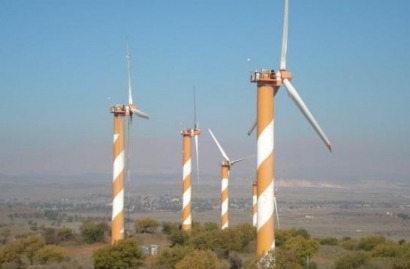
The Bonn, Germany-based organization described Israel is being "blessed with renewable energy resources" and said the nation has "recently made important steps for a substantial growth of wind power utilization."
Most recently, the government's Inter-Ministry committee has issued a request for proposals for the allocation of land for wind farms, establishing a 20 January 2012 deadline for their submission.
The work of the Inter-Ministry committee, along with efforts of setting up the zoning regulations by the ministry of interior, and the availability of a feed-in tariff, all pave the way for the wind market of Israel to emerge, the association said in a written statement.
"WWEA trusts the potential of wind energy in Israel and the region to be substantial," said WWEA President He Dexin. "We congratulate the country on the important decisions that have already been taken and we are willing to provide our support to the country as well as to our member, the Israeli Wind Energy Association, in their efforts in structuring the local market."
In October 2012, the IWEA presented the wind map of Israel to the Inter-Ministry committee with locations of wind farms under development at various stages.
During the presentation, US wind energy consultancy 3TIER suggested Israel's wind energy potential could be as high as 2 GW, an opinion seconded by Shlomo Wald, Chief Scientist of Israel's Ministry of Energy, Gadi Hareli, CEO of the IWEA, and others.
According to the IWEA, current regulatory requirements for wind take a little longer to traverse than those for solar, with development stages requiring wind assessment campaign and environmental surveys.
But once these requirements are completed, the process of setting up a wind farm is a simple and quick process, Hareli said in a recent dispatch to organization members, adding, "Erecting a wind turbine of 3 MW is completed in less than a day – the equivalent of laying down 30,000 square meters of solar panels for the same 3 MW."
The IWEA argues that wind energy is a win-win for Israel in two particularly meaningful respects: First, it uses land -- something the country is short of -- in an economical way. Secondly, it is also less dependent on scarce water supplies that other energy-generating sources.
Next up for the IWEA, hosting the Israel Wind Energy Conference in Tel Aviv on 29 January.
"Today, there are over 2,000 MW of accumulated requests for wind farms in Israel that will need to be processed by the authorities in the near future," Hareli said. "The Israel Wind Energy Conference will be an excellent opportunity to explore this new emerging market."
Israel's first wind farm was built in 1002 in the Golan Heights. It consists of 10 Floda 600 turbines and generates 6 MW of power for the Mey Eden mineral water bottling plant, the Golan Heights Winery and approximately 20,000 local residents.
Surplus energy produced by the facility is fed into the electrical grid.
For additional information:

